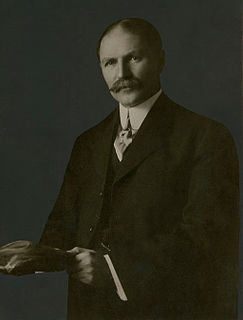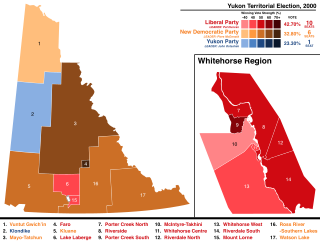Related Research Articles

Whitehorse is the capital and only city of Yukon, and the largest city in northern Canada. It was incorporated in 1950 and is located at kilometre 1426 on the Alaska Highway in southern Yukon. Whitehorse's downtown and Riverdale areas occupy both shores of the Yukon River, which originates in British Columbia and meets the Bering Sea in Alaska. The city was named after the White Horse Rapids for their resemblance to the mane of a white horse, near Miles Canyon, before the river was dammed.

The Yukon Legislative Assembly is the legislative assembly for Yukon, Canada. The Yukon Legislative Assembly is the only legislature in Canada's three federal territories which is organized along political party lines. In Nunavut and the Northwest Territories, the legislative assemblies are instead elected on a non-partisan consensus government model.

George Black, was an administrator and politician in Yukon, Canada. He went to Yukon in 1898 during the Gold Rush and prospected for gold, making a fortune and losing it when his claim was swept away in a flood. He then established a law practice in Dawson City. He was elected to the Yukon Territorial Council in 1905, and first ran for the House of Commons of Canada in the 1908 federal election but was defeated.

The Yukon general election of 2000 was held on April 17, 2000 to elect members of the Yukon Legislative Assembly in the Yukon Territory in Canada. The incumbent NDP government was defeated by the Liberal Party who formed a majority government

Northwest Territories is a federal electoral district represented in the House of Commons of Canada.
The 1900 Yukon general election was the first general election in the history of the Yukon territory held on October 18, 1900.

James Hamilton Ross was a Canadian politician, the Yukon Territory's third Commissioner, and an ardent defender of territorial rights. He is also considered to be the first resident of Moose Jaw, Saskatchewan.

Klondike is an electoral district which returns a member to the Legislative Assembly of Yukon in Canada. One of the Yukon's eight rural ridings, it is also the oldest riding in the Yukon, first established in 1905. The riding includes Dawson City and its environs, as well as Eagle Plains.
This article provides a timeline of elections in Canada, including all the provincial, territorial and federal elections. The information starts from when each province was formed or entered the Confederation, and continues through to the present day.
The 1920 Yukon general election was held on February 25, 1920 to elect the three members of the Yukon Territorial Council. The number of councilors was reduced from ten in the previous election to three following the general decline in population since the Klondike Gold Rush. The council held an advisory role to the federally appointed Commissioner.
The 1922 Yukon general election was set to be held on September 11, 1922. The results of the election were known on August 12, 1922 when all three electoral districts returned members to the Yukon Territorial Council by acclamation. The council played an advisory role to the federally appointed Commissioner.
The 1925 Yukon general election was held on 7 September 1925 to elect the three members of the Yukon Territorial Council. The council was non-partisan and had merely an advisory role to the federally appointed Commissioner.
The 1903 Yukon general election was held on January 13, 1903. The council was expanded to elect five of the ten members to the Yukon Territorial Council. The election was fought along party lines even though the council was limited in its powers and played an advisory role to the federally appointed Commissioner.
The Anglican Diocese of Yukon is a diocese of the Ecclesiastical Province of British Columbia and Yukon of the Anglican Church of Canada. It comprises 14 congregations serving 24 communities in the Yukon and parts of northern British Columbia.
The Independent Alliance Party was a political party in the Canadian territory of Yukon that split from the Yukon Party in June 1991. The two original members were Bea Firth and Alan Nordling, both former members of the Yukon Party.
Dawson electoral district was a territorial electoral district in the Yukon Territory, Canada. The electoral district was created in 1905.
References
- ↑ Steven Smyth, The Yukon's Constitutional Foundations: Volume One, The Yukon Chronology (1897-1999). Clairedge Press, 1999.